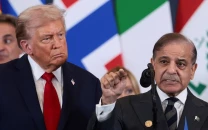A win for hard power rather than soft
The implications of the proposed US aid cuts on developing countries would indeed be severe

The writer is a development anthropologist currently based in Fairfax, Virginia, and teaches at Georgetown and George Washington universities
If Congress backs the proposed budget, the US funding for international development work is projected to experience a 28% budgetary cut. This major reduction would severely curtail the ability of the State Department and the United States Agency for International Development to fund and initiate development works overseas. The proposed cut to aid spending would also decrease financing available for global climate change prevention, funding for UN peacekeeping and other human development efforts, and even lessen financing capacity of lending agencies like the World Bank.
The incoming administration claims it is cutting international aid so that other advanced countries also take on a fair share of the global development burden. The US is the largest international donor at present, but in absolute terms only. It is ranked 22nd out of all wealthy countries, in terms of the amount of money it spends on international development in comparison to the size of its economy. Hence, the argument that other advanced countries need to spend more in comparison to the US, is not very convincing.
The implications of the proposed US aid cuts on developing countries would indeed be severe. Already, UN agencies and international NGOs are having a tough time dealing with the multiple crises and development challenges plaguing the world, ranging from famine to addressing the plight of refugees, in addition to ensuing provision of basic human needs such as clean water or basic education.
Conversely, there is no dearth of rationalist arguments for preserving US international aid commitments. A recent article in Foreign Policy, for example, has criticised Trump’s assertion that his budget is critical “to keep Americans safe.” The article instead describes that the president’s budgetary proposal as being shortsighted and failing to recognise the critical role international development assistance plays in addressing complex global security challenges.
The work performed by aid agencies has increasingly been recognised as a strategic asset that is no less powerful than the military in confronting multifaceted challenges. The so-called ‘soft power’ of aid is also much less costly than defence spending. Earlier Republican presidents, including Ronald Reagan and George H Bush and George W Bush had, in fact, increased foreign aid significantly during their tenures. It remains to be seen if the Republican dominated Congress will now approve their new president’s proposal to reverse that tide.
The above arguments are not meant to insinuate that the soft power of foreign aid by powerful countries can solve all global problems. Often US aid itself has been ‘tied’, whereby much of it goes back to paying US companies to undertake development projects around the world. US foreign aid has been criticised for prying open markets in developing countries, for decreased public spending, and for pursuing models of economic growth which don’t address inequality. The carrot of US aid has also been used to compel countries like our own to follow US strategic interests. However, at the end of the day, provision of foreign aid does less harm than using military might to exert the might of a nation beyond its borders.
Published in The Express Tribune, March 24th, 2017.
Like Opinion & Editorial on Facebook, follow @ETOpEd on Twitter to receive all updates on all our daily pieces.














COMMENTS
Comments are moderated and generally will be posted if they are on-topic and not abusive.
For more information, please see our Comments FAQ